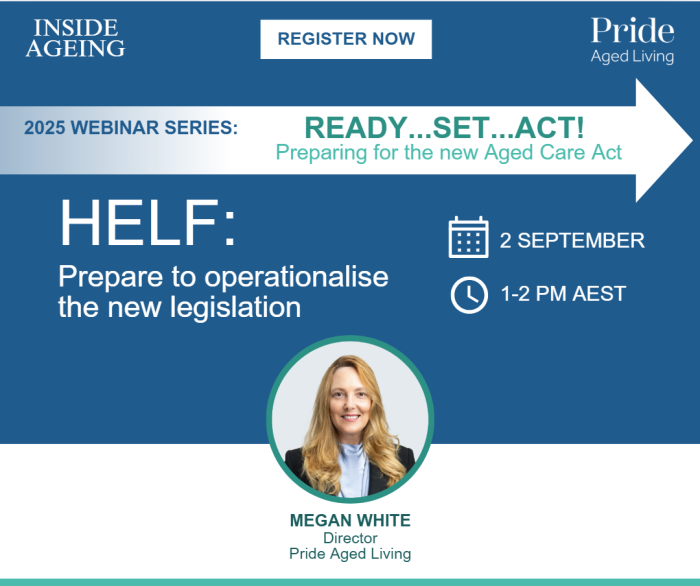HELF and Reform Transition Planning

The introduction of Higher Everyday Living Fees (HELF) under the new Aged Care Act provides an opportunity for providers to embrace a person-centred model and ensure long-term financial sustainability.
When positioned within broader reform planning - documentation, processes, training, and accreditation (now registration) - HELF becomes a natural part of the new government framework, not a separate or contentious initiative.
Framing HELF this way helps move from “should we charge?” to “how do we deliver?”, building understanding and supporting solution-driven discussions.
What We Are Seeing Across the Sector
Many providers with existing Additional or Extra Services are transitioning to HELF-compliant programs in preparation for 1 November.
Some providers are opting for a phased implementation, targeting the first half of 2026 to allow for other reform priorities and to see how others implement HELF.
HELF services are strategically important - not only for enhancing resident experience, but for sustainable ongoing investment in higher-quality services.
Where HELF Fits Within the Reform Framework
HELF intersects with several key elements of the aged care reform program. Its implementation requires a clear understanding of new compliance expectations and a workforce confident in delivering optional services appropriately.
Residential Care Services List (RCSL):
Your team needs to understand what constitutes funded care and services under the Act, as outlined in the new RCSL, and which services are considered optional because they are above or additional to what is funded. This understanding not only strengthens communication with residents and families, but also reduces the risk that aged care workers will resist providing or managing HELF services in a compliant manner.
Strengthened Standard 1 – Consumer dignity and choice:
HELF supports this Standard by enabling residents to personalise their experience. When positioned correctly, HELF is about empowerment, not inequality. It is optional, and residents should be supported to choose services that align with their lifestyle and wellbeing - without pressure or judgement.
A question raised regularly is: “Do you think HELF will create a have/have not environment in the home?”. The principle behind HELF is that the basic (funded) level provides an adequate level of care and services for residents’ well-being and quality of life, and where offered, HELF increases the options and supports the resident being central to the delivery of care and services.
Suggesting that residents are worse off without HELF risks implying that the core funded care is inadequate. Supporting staff in understanding how HELF can empower and support resident choice and decision making will increase staff engagement in promoting and delivering the HELF program.
Outcome 1.3: Choice, independence and quality of life:
Importantly, the Outcome Statement requires providers to support residents to exercise dignity of risk and make decisions that promote choice, independence and quality of life. Substitute decision-makers should only be used after all support options have been exhausted.
Staff should support resident choices - not direct them. Suggesting what residents “should” have risks undermining independence and contradicts the intent of this outcome.
Strengthened Standard 6 – Food and nutrition:
Food and nutrition is a central focus of HELF, with many residents likely to prioritise dining options. Standard 6 has raised key questions - for example, whether to charge for certain HELF items or include them as part of the organisation’s identity.
In our view, offering items free may blur the distinction between funded and optional services, and unintentionally limit resident choice. A clearer approach is to align HELF offerings with the RCSL and strengthened Standards, allowing residents to decide - for example, whether they wish to purchase a hot breakfast or a soft drink with meals.
The Act and Resident Rights:
We are also seeing changes in the new Act that reinforce resident rights and empowerment. The removal of the term representative and the introduction of registered supporter reflect a clear shift toward supported - not substituted - decision-making.
Statement of Rights (s23) confirms that residents have the right to:
- exercise choice and make decisions about funded aged care services,
- decide how, when and by whom services are delivered,
- control financial affairs and possessions, and
- take personal risks in pursuit of quality of life, social participation, and relationships.
HELF aligns with these rights by giving residents freedom to choose services that enhance lifestyle, while ensuring core funded services remain sufficient and safe.
Operationalising Mixed Service Delivery
One of the most frequent concerns we hear relates to fairness and logistics. How can a provider deliver a consistent experience when some residents purchase HELF services and others do not?
The answer lies in:
- clear service documentation and communication;
- confident, consistent staff practices;
- respectful delivery that ensures all residents feel included, regardless of their purchasing decisions.
In our experience, providers who embed this into staff training are better placed to create a stable, inclusive service environment.
The Opportunity for Providers
HELF is more than a fee structure. It is a strategic tool for reform alignment, resident empowerment, and sustainable service delivery.
When delivered effectively, HELF allows providers to:
- demonstrate alignment with the Aged Care Act and strengthened Standards;
- embed consumer dignity and autonomy into daily care;
- strengthen financial resilience and fund quality improvements;
- differentiate themselves in a changing market driven by reform.
By embedding HELF into transition planning, providers can deliver optional enhancements that meet regulatory expectations while reflecting values of choice, quality, and respect.
Need Help with HELF?
Our HELF transition and implementation services are designed to streamline your journey, ensure compliance, and position your organisation for success under the new regulations.
Join Next Week’s HELF Webinar
We’re hosting a webinar with Inside Ageing on Tuesday, 2 September:
HELF: Prepare to operationalise the new legislation

Learn more and register here.
To find out how we can assist your organisation with Higher Everyday Living Fees, contact Megan.
Megan White
02 9068 0777
megan.white@prideagedliving.com.au

